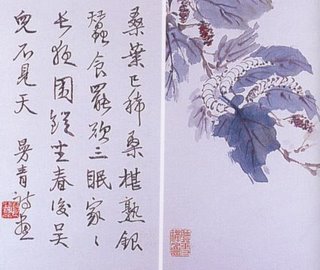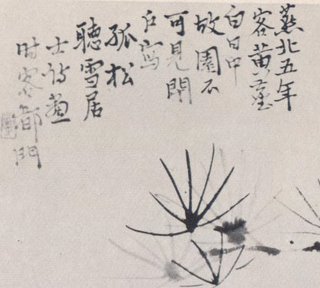Cheng Man-ch'ing: Zen Monk Who Listens to Falling Snow
This post explains the tantalizing hints revealed at the end of the August 1st post.
From his early twenties until his mid-thirties, Cheng Man-ch'ing maintained a youthful fascination with Zen Buddhism. As early as 1924, Cheng was signing his artwork the Monk Who Listens to Falling Snow 聽雪居士and creating works in a studio named Listening to Falling Snow Zen Hut 聽雪禪廬. As I explained in my forthcoming book on Cheng, A Journey Toward Undivided Spontaneity:
"Of particular note in this early 1924 painting album is Cheng’s interest in Zen Buddhism, a fascination altogether absent from his later, more mature works. Zen exerted a profound influence on Chinese artists of the early Republican period, as the fall of the Confucian tiered system of the Late Ching Dynasty gave way to the free and open exchange of philosophical viewpoints from scholars and artists who were once tethered to that system. The authors of leaves two and four mention Cheng’s youthful fascination with Buddhism, and specifically Zen, and Cheng himself assumed the sobriquet, Monk Who Listens to Falling Snow. Artists who styled themselves as floral, or nature artists, found unique inspiration in the precepts of Zen. Zen inspired the artist to see beyond the illusion of reality in a motif and encouraged them to delve deep within both themselves and the motif, dissolving apparent distinctions and illuminating the primal unity of life. Though a pure Zen adept would propound the elimination of thought and consciousness, Chinese artists altered, or corrupted Zen, so as to allow their consciousness to interact with their sub-consciousness. Later in life, Cheng would reclaim his Confucian heritage and oppose Buddhism as akin to fantasy and pornography."
Below is a reproduction from Cheng's 1924 album entitled Lonely Pine:
Yellow dust floats upon a clear day.
Since no longer can I visit my old garden,
I lock my door and paint a lonely pine.
Signature Poetry and Painting by the Hermit Who Listens to Falling Snow
One Seal Man (rectangular relief)
In this painting from his 1932 album entitled Silver Wu Silkworms, we see that Cheng still seals his paintings with his studio name Listening to Falling Snow Zen Studio:
 Silver Wu Silkworms
Silver Wu Silkworms
The mulberry leaves are already scarce and their fruit has turned ripe,
Eat heartily you silver silkworms, then slumber your three sleeps.
Every home spends the long night sitting in the garden drinking,
After spring your Wu offspring will never see the sky.
During the mid-thirties, Cheng's Taoist tendencies led him to assume a new sobriquet, the Hermit Fu-ch'iu. This and other new material will be presented in my next post.
 Silver Wu Silkworms
Silver Wu SilkwormsThe mulberry leaves are already scarce and their fruit has turned ripe,
Eat heartily you silver silkworms, then slumber your three sleeps.
Every home spends the long night sitting in the garden drinking,
After spring your Wu offspring will never see the sky.
Colophon Seal Cheng (square intaglio)
Painting Seal Listening to Falling Snow Zen Hut (square relief)
During the mid-thirties, Cheng's Taoist tendencies led him to assume a new sobriquet, the Hermit Fu-ch'iu. This and other new material will be presented in my next post.


0 Comments:
Post a Comment
<< Home